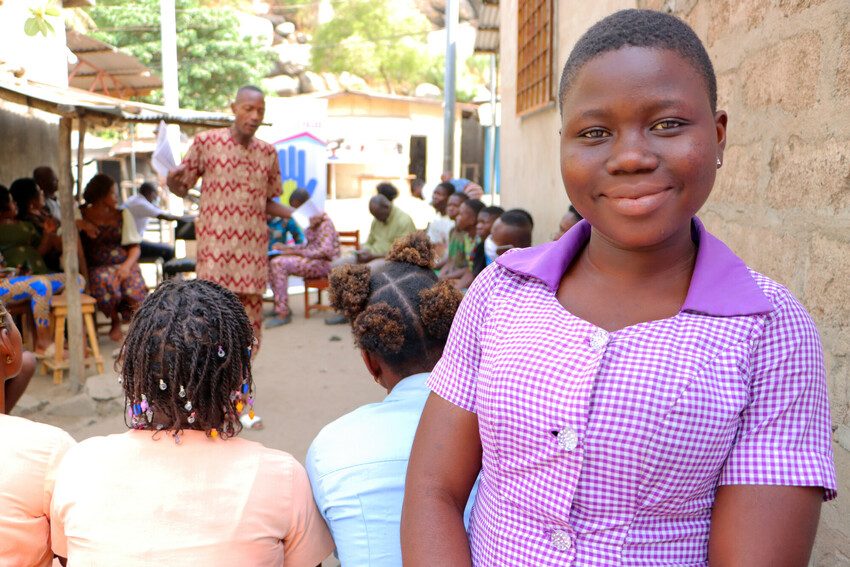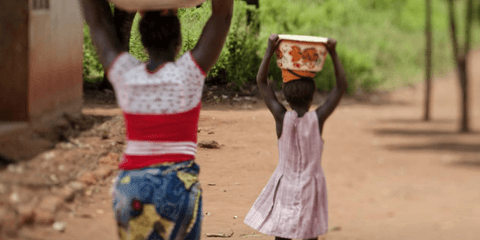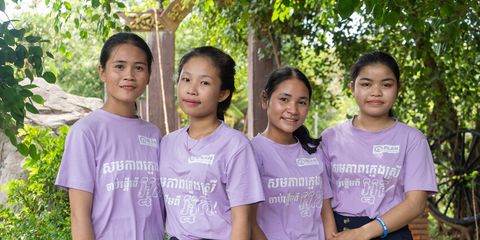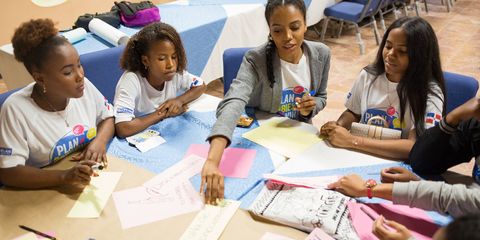Amplifying youth voices on sexual health and rights in radio programming in Benin
12 February 2024Girls have been sharing their learnings from our sexual and reproductive health and rights programming on the radio in Benin.

Blog by Dr Keya Khandaker, Research Engagement Officer
‘Real Choices, Real Lives’ (RCRL) is a qualitative longitudinal study following the lives of girls in nine countries from their births in 2006 until they turn 18 in 2024. The study has a distinct commitment to understanding the root causes of gender inequality by asking questions about beliefs, values, and expectations which aim to uncover how gendered social norms and behaviours are created and sustained or shift over time.
In 2023, the Plan International research study Real Choices, Real Lives partnered with Plan International Benin and Cardiff University to use evidence of girls’ real-world experiences, opinions and recommendations about sexual health and wellbeing to design and broadcast radio programming to promote positive dialogue between girls and their caregivers about adolescent sexual and reproductive health and rights (SRHR).
The project is born out of RCRL evidence concerning girls’ experiences of their sexual health and wellbeing, which revealed that girls themselves are keen to receive more information about their bodies and healthy relationships from their caregivers:
“Yes, there are lots of things I would like to learn about sexuality and puberty so I can use this knowledge as I grow up. I would like to know … how to react to men who shout things at me in the street.”
– Isabelle*, aged 14 (2023)
This evidence was the basis of anonymised stories that explored girls’ and their caregivers’ attitudes towards SRHR and their experiences of conversations on girls’ health and wellbeing. The project engaged with nine young people from two communities in Benin, who used the foundational stories as inspiration to write scripts for sketches and commentary that were aired on local radio.
For more information on the process, please see the Guidance Note.
From this project many learnings came about that reflect the common contentions experienced in development programming: imposing norms, community ownership, and assuming knowledge levels.
Our 3 key takeaways for implementing a similar initiative are:
1. Invest time to discuss social norms and SRHR with youth
Giving the young people the opportunity to co-produce the radio shows – through sketch-writing – meant they could tell the stories that matter to them.
Youth will have different levels of knowledge about SRHR issues. Training these young people on the key topics of SRHR, with a girls’ rights perspective better equips them to understand the foundational stories and to have more confidence to tell the stories on their own terms. This ensures that the scripts produced align with best practice evidence and are grounded in a strong knowledge of SRHR issues.
“I now have a better understanding of hygiene during menstruation.”
Female workshop participant, aged 14 (2023)
2. Long-term programming supports social change
We produced and broadcast one radio programme, which we found sparked listeners’ interest to participate in youth-caregiver dialogues about SRHR. However, despite reporting an increase in their understanding of SRHR topics and the importance of discussing sexual health and wellbeing with children, some adults still felt unsure about how to broach the topic with their children and were interested in participating in a longer-series of programmes.
More programmes could improve caregivers’ confidence and knowledge to have these dialogues with young people. We suggest planning and resourcing for more radio programmes. This may come in the form of repeat broadcasts or through writing and recording multiple, different episodes along the same theme, to show applicability of this knowledge in different scenarios. This could ensure that the project is challenging discourses in the same way that the RCRL cohort girls had highlighted the need for in 2021.
“Parents have obtained a lot of information (following the radio programme).”
Female workshop participant, aged 17 (2023)
3. This format can be used for any topic, in any community!
The intervention was based on a specific aspect of girls’ lives – their sexual health and wellbeing – and can be applied to other aspects of girls’ lives too, such as education, participation, and leadership. As well as this, radio is not the only medium you can use.
The value of this project is that this format can be used for other media too: foundational stories based on data, followed by youth workshops to turn the stories into scripts or storyboards, and recording/broadcast of the product. There is potential to use this approach for not only radio programming, but also videos, animations or social media campaigns.
Together, these learnings point towards ways we can create evidence-based programming that is community- and youth-led, to give young people the freedom to take ownership of how girls’ rights are advanced in their communities.
This project was funded by an impact grant from the Arts and Humanities Research Council. To learn more about this project, and how the approach could be replicated in other communities, please see the Guidance Note.
Download the guidance note:
Guidance note – English
5 mb
Guidance Note – French
3 mb
Using evidence for impact is a critical priority for Plan International – we strive to ensure that our research informs evidence-based programmes and interventions.
* All names in this report have been changed to protect the girls’ identities.


